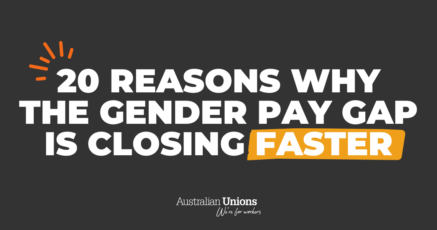Women take on more domestic labour than men, we know that. It even has a name – ‘the second shift’. That is, the work women do after work.
But what is a little more difficult to track is ‘the mental load’ that also falls to women over men. It can sometimes fly under the radar because it is invisible and boundaryless.
What is the mental load?
The mental load is defined as ‘emotional and cognitive labour’ made up of all of the logistical tasks that have worry, stress or emotion attached to them – thinking about planning dinners, kids parties and clean school uniforms for example.
Unlike domestic labour, there is no end to the mental load. In fact, children are even more likely to interrupt their mother’s than their father’s sleep.
What are the consequences for women?
The mental load defaults to women not because they are inherently ‘better multitaskers’.
Rather, it all comes back to the devaluation of women’s work and time. But the mental load can have serious mental health consequences, including burn out from ‘decision fatigue’.
Decision fatigue is the result of the thousands of tiny choices we make every single day. Whether it’s deciding what to eat for breakfast or where to go on a night out, these mental exertions can quickly deplete our time and energy.
But ‘decision fatigue’ can leave women vulnerable, overwhelmed by choice and unable to compromise or bargain. Constantly having to make small decisions over household and family things can lead women to breaking point.
My husband and I had what I refer to as “The Toothpaste Incident” ~12 years ago, when we were grocery shopping after work and I asked him to please grab toothpaste, and he kept asking me which one, and I lost my shit right there in the Safeway toothpaste aisle.
— Personally victimized by the NL West (@kari_marie) June 15, 2022
It seeps into the workplace too
In this article by Rose Hackman, she explains that emotional labour in a work context refers to the ‘expectation that a woman should manipulate her feelings’ to satisfy the requirements of the job.
This includes influencing office harmony by remembering colleagues’ birthdays, making friendly small talk with staff, and volunteering to do menial tasks, like making coffee or printing documents – on top of their regular duties.
And although it’s never explicitly stated in the job description, most customer service jobs expect workers to cater to the emotional needs of each customer.
Retail worker and union member Freya Howarth describes the emotional labour of working at a bookstore as, “never just about selling a product.”
“After all, people can buy books online at their leisure. Customers who come into the bookshop are buying an experience,” she says.
“When a customer asks for advice, for example, I have to gauge whether they truly want my opinion, or simply want me to validate theirs. Am I being asked a genuine question, or is it a trap to reveal my imperfect knowledge?”
“These rapid character assessments and personality shifts can be surprisingly taxing when carried out over the course of a shift, usually several days a week, often for multiple years,” Howarth says.
What can be done?
There is still a lot of work to do to fix these problems within the home, but there are tangible things that employers and governments can do to help ease the mental load.
We have quantified the mental load and expectations of unpaid labour placed on women. So we know the best way to start supporting working women is with flexible working conditions and free child care.
Unscrupulous bosses may find it easier to simply sweep the issue under the rug which is all the more reason why it’s so important to be part of the union in your workplace to ensure everyone is treated fairly.
Australian Unions is made up of almost 2-million workers coming together to get things done. If you want to see change, together, we can take action to drive that change.
That means better wages than non-union members, the workplace conditions you deserve and support standing by if anything goes wrong.







SHARE:
The ‘mental load’ leads to burn out for women